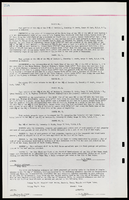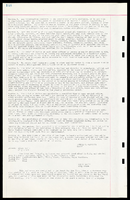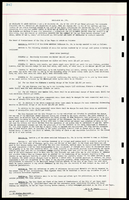Search the Special Collections and Archives Portal
Search Results
Fallman Family Papers
Identifier
Abstract
The Fallman Family Papers (approximately 1950-2005) consist of correspondence, newspaper clippings, photographic prints and slides, scrapbooks, and pamphlets from James and Ima Fallman and their daughter, Janice. The correspondence primarily relates to James and Ima Fallman and chronicles Ima's involvement with the Francisco Garces chapter of the Daughters of the American Revolution (DAR), James's work as a bartender in Las Vegas, Nevada, and awards he received during World War II. The newspaper clippings mention either James Fallman or his daughter, Janice, and her involvement with the Las Vegas High School Rhythmettes dance team. The majority of materials from Janice describe her school days at Las Vegas High School and events participated in as a child and young adult.
Archival Collection
Ronzone Family Papers
Identifier
Abstract
Ronzone Family Papers (1900-1991) include newspaper clippings, business documents, correspondence, certificates, yearbooks, publications, artifacts, and photographs. The papers document their lives in Nevada, their department store, and Dick Ronzone's involvement in local politics.
Archival Collection
Mabel Hoggard Papers
Identifier
Abstract
The Mabel Hoggard Papers (1903-2011) contain materials related to Hoggard's career as a Las Vegas, Nevada elementary school teacher, her research and civic interests in Las Vegas's predominantly African American Westside communities, and her engagement with civil rights issues. The collection also contains materials about Hoggard's life, including biographical newspaper articles about her childhood, education, work, and family. The collection includes lesson plans, scrapbooks, awards, correspondence, photographs, and physical objects such as a vinyl record and political pins. The bulk of the collection focuses on her life in Las Vegas from approximately 1946-1989.
Archival Collection

Eric Mendoza oral history interview: transcript
Date
Archival Collection
Description
Oral history interview with Eric Mendoza conducted by Holly O'Donnell on November 29, 2021 for Reflections: The Las Vegas Asian American and Pacific Islander Oral History Project. In this interview, Eric Mendoza shares his family's chain migration history from Manila, Philippines to the United States and his difficult immigration and naturalization process once arriving in America in 1996. He talks about what brought him to live in Las Vegas, Nevada, his education and professional pursuits, what his life is like in the United States compared to that of the Philippines, and the lives of his eight siblings. Eric Mendoza discusses the historical past of the Philippines, the infrastructure in place there, and government corruption. He also speaks to Filipino traditions and festivals, food and customs, his cultural identity, and assimilating to American culture.
Text

Transcript of interview with Jarmilla McMillan-Arnold by Claytee D. White, October 7, 2010
Date
Archival Collection
Description
Jarmilla McMillan-Arnold’s father, Dr. James B. McMillan, was the first black dentist in the state of Nevada. Dr. McMillan’s colleagues consisted of Dr. West, the first black medical doctor in the state, and Dr. Ice, the first black surgeon in Nevada. This interview highlights and archives the solid foundation upon which Nevada’s black community was built. Jarmilla recalls early memories of growing up as the daughter of Las Vegas NAACP president Dr. McMillan. She was born in Detroit, Michigan, to a Caucasian and Indian mother who was a professional dancer. Jarmilla’s parents separated when she was very young and as a result she was raised by her paternal grandmother who owned a restaurant in Pontiac, Michigan. Jarmilla describes her grandmother as being well-known and highly regarded in the community where she maintained her business. Jarmilla attended Catholic schools in Detroit, Pontiac, and Las Vegas. Having moved to Las Vegas with her father, Jarmilla’s narrative offers keen insigh
Text
Fayle Family Photographs
Identifier
Abstract
The Fayle Family Photographs depict the Fayle Family in Southern Nevada and California from 1888 to 1990. The photographs primarily include family photographs of Leonard Fayle, Anna Louise Trapnell Fayle, Leonard Fayle’s parents George Fayle and Jean Henderson Fayle, Leonard Fayle’s siblings George Arthur Fayle and Jean Nevada Fayle, and Leonard and Anna Fayle’s children Jane and Edward Fayle. The photographs also depict the Nevada towns of Las Vegas, Goodsprings, and Jean, including railroad operations, mining, milling, and hauling freight. The collection includes a leather-bound photograph album containing images of the Fayle Family and the Yount Family.
Archival Collection
Fayle Family Papers
Identifier
Abstract
The Fayle Family Papers (1895-1998) document the family's personal and business interests in Goodsprings, Nevada and Las Vegas, Nevada. The collection contains mining documents, business records, and photographs from Leonard Fayle’s work with the Las Vegas Valley Water District, where he documented reservoirs, dams, and both abandoned and functioning mines. The photographs also include family members, vacations, and Southern Nevada fraternal organization pictures.
Archival Collection



